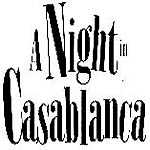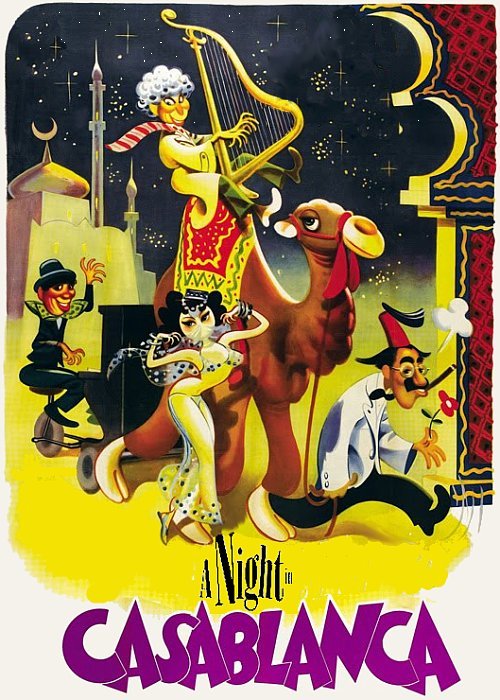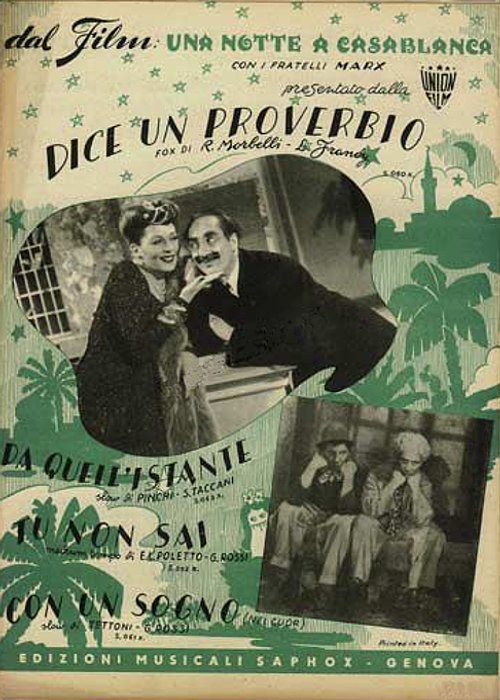
[Main Page] | [History] | [Vaudeville] | [Misc.] | [Films & Film Projects]
 | Mikael Uhlin's Marxology @ marx-brothers.org
[Main Page] | [History] | [Vaudeville] | [Misc.] | [Films & Film Projects] |


|
This film started life as Adventure In Casablanca and was preceded by a short tour principally in Army camps along the Pacific coast in August 1945 to get routines in shape and to memorize the material. Five comedy sketches were performed including a tailor-undressing bit followed by a burlesque duel skit, a dining scene, a Harpo-Chico pantomime and the packing-unpacking routine. Filming started on 3 October and was finished in early December. The first version of the film ran for two hours. At the first proper preview in early January 1946, the film ran 113 minutes but was received unenthusiastically by audience and Marxes alike. Desperate cutting before the release on 10 May 1946 reduced the film to 85 minutes. Most of the cuts are visible in the finished film as quick fade outs. Presented here are two scenes which appeared early in the film. They've been reconstructed thanks to an excerpt from Movie script, 3rd Partial Revision: September 5, 1945 in Simon Louvish' book Monkey Business and D.L. Ames' A Night In Casablanca - The Book of the Film, a novelization of the film published in England in 1946.
This scene probably appeared about 10 minutes into the film after
Governor Galoux and Captain Brizzard decided to send a telegram to the
manager of the
Desert View Hotel, offering him the post of manager of Hotel
Casablanca. |

Yellow Camel Taxi ServiceShortly after this, Groucho arrives in Casablanca and is
greeted by Chico. After a short conversation about Chico's camel, the
scene fades but here's the continuation: Groucho What do you do with your
camels?
How do you rent them? By the hour? Chico I just fill them up with water
and
they go for eight days. Groucho What do you feed them? Chico Peanuts - it's the healthiest
food in
the world. Groucho How do you know? Chico I was a monkey for three years. Groucho (glancing at him
doubtfully) It's been longer than that. Chico Twenty francs for a camel with
two
humps, and ten francs for a camel with one hump. Groucho What do you charge for a
camel with
no humps? Chico A camel with no humps is a
horse. I
gotta horse too, but the horse has a bump. Groucho (eyeing the street
below
him wistfully) If I could get back down there I'd go that way. Chico Don't worry about the price,
Boss.
Whatever you got - I take.
(They arrive at the hotel and is greeted by Harpo, who takes possession of Groucho's carpet-bag) Groucho Be careful of that.
Everything I own
in the
world is in that bag! (The bag flips open) Chico Hey! That bag is empty. Groucho That'll give you an idea what
I own. Chico (returning to
business)
That'll be one hundred francs, Boss. Groucho But the meter says fifty
francs. Chico Yeh, but I told you. It's
double for
a camel with two humps. (Groucho gives up and pays but behind his back
Chico
removes one detachable hump. Meanwhile, Harpo produces a whisk broom
and begin violently to brush what remains of Groucho's threadbare suit) Groucho Hey, get away from me. What's the idea? What do you do anyway? (Harpo pulls out a red-hot iron from his
trousers, wets
his
forefinger and touches the iron with a little phut) Chico That's what he does, Boss. He's
a
valet. Groucho But he was trying to undress
me. Chico That's his business. He dresses
and
undresses the Count. Rusty's got a very tough job - the Count's got a
lot of clothes. He makes sixteen changes a day. Groucho What's so wonderful about
that? I
did that when I was three months old. The Italian dub
The first Italian dub of this movie from 1950 is interesting since it replaced the music in the film with Italian tunes. Thus, the sheet music above was sold as music from "Una Notte a Casablanca con i fratelli Marx" and included the tunes Dice un proverbio by Morbelli & Frandy, Da quell'istante by Pinchi & Taccani, Con un sogno by Tettoni & Rossi plus Tu non sai by Poletto & Rossi. To overdub not just the dialogue but also the music was once a common practice in Italy, and other examples of this is the tune Shine on Harvest Moon from Laurel & Hardy's film The Flying Deuces (1939), which was replaced by A Zonzo (like Dice un proverbio also written by Riccardo Morbelli) in the Italian version. As late as in 1963, the Italian version of Jean-Luc Godard's film Contempt (starring Brigitte Bardot) replaced George Delerue's musical score with a completely different score written by Piero Piccioni. |